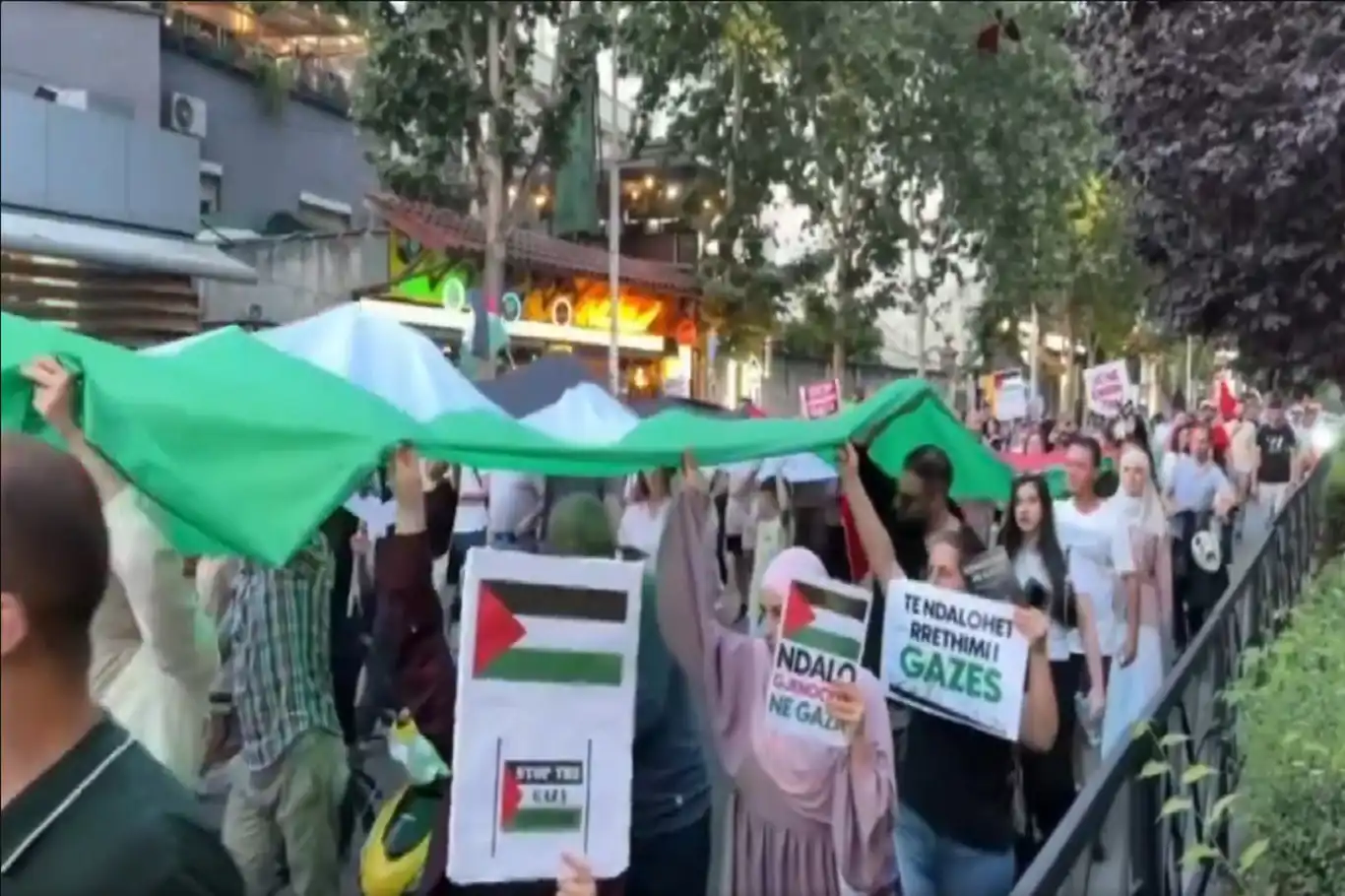Historic Unity: Nearly 300 Albanian Imams Declare Support for Gaza


Nearly 300 Muslim religious leaders from across Albania have issued a joint declaration denouncing Israel’s ongoing military assault on the Gaza Strip as “genocide.”
The wide-reaching statement, signed by imams, Islamic scholars, and community leaders from nearly every region of the country, called on Muslims worldwide to break their silence, reject indifference, and take concrete steps to confront the systematic destruction of Gaza’s population.
“This is not a war; it is a genocide against a besieged people who have no means to defend themselves,” the declaration stated, directly accusing Israel of targeting civilians and weaponizing starvation to push Gaza to the edge of famine.
Observers note that such a large-scale, unified statement from Albania’s Muslim leadership is unprecedented in recent decades. Albania, a country with a Muslim majority but a formally secular state structure, has long balanced its identity between its Ottoman-Islamic heritage and its European and NATO-aligned political orientation.
The declaration signals growing frustration among ordinary Albanians who have watched in outrage as Israel’s campaign in Gaza continues to kill tens of thousands, while international institutions fail to intervene effectively. The statement also reflects a broader mobilization across Albanian civil society, where NGOs, youth movements, and mosque congregations have increased their pro-Palestinian activism since October 2023.
The Albanian religious leaders spared no words in their criticism of Western powers, denouncing governments that continue to supply weapons and funding to Israel despite what they called undeniable evidence of atrocities. At the same time, the declaration targeted Muslim-majority governments, accusing them of failing to act decisively at a moment of existential crisis for Palestinians.
“History will judge their inaction,” the statement warned, urging leaders of the Muslim world to move beyond symbolic gestures and take material steps such as sanctions, boycotts, and international legal action against the Israeli regime.
In one of the most striking passages, the statement rejected the idea that spiritual support alone was sufficient. “It is not enough to pray for Gaza,” the signatories wrote. “We must speak out, act, and stand firmly against oppression wherever it exists.”
The leaders called on Muslims worldwide to pressure their governments into taking stronger positions, boycott companies complicit in Israel’s war machine, and provide direct humanitarian and political support to Palestinians resisting annihilation.
The declaration also underscores mounting tensions between Albania’s Muslim population and the government of Prime Minister Edi Rama. Despite widespread public outrage over the devastation in Gaza, Rama’s administration has maintained close cooperation with Israel, including security, intelligence, and economic ties.
This alignment with Tel Aviv has drawn criticism not only from civil society groups but also from political analysts who say Rama’s stance is increasingly out of touch with the sentiments of ordinary Albanians. The latest statement by the country’s religious leaders highlights this widening gap and may place additional pressure on Tirana to reassess its position.
Albania’s clerical declaration comes amid a wider shift across the Balkans, where Muslim communities in Bosnia, Kosovo, North Macedonia, and Montenegro have organized demonstrations, solidarity marches, and fundraising campaigns for Gaza. Religious leaders in neighboring countries have also raised their voices, though none with the scale or coordinated force seen in Albania’s recent statement.
Analysts suggest this reflects a broader revival of Islamic solidarity in the Balkans, a region where memories of ethnic cleansing, war, and international inaction in the 1990s remain fresh. For many, the suffering of Palestinians echoes their own historical experiences of oppression and displacement.
The Albanian statement arrives at a time when international human rights organizations, aid agencies, and even UN bodies have sounded alarms over the humanitarian catastrophe in Gaza. Reports point to entire neighborhoods reduced to rubble, a collapsed health system, widespread displacement, and famine conditions affecting hundreds of thousands of civilians.
By framing the conflict not as a conventional war but as a genocide, Albanian Muslim leaders have positioned themselves as part of a global moral voice demanding accountability and justice.
For Albania’s Muslim leadership, the crisis in Gaza is not only a humanitarian emergency but also a test of conscience for the global Muslim community. Their call to action — to boycott, to pressure governments, and to refuse silence — reflects a deepening conviction that solidarity with Palestine must go beyond words.
Whether Albania’s government shifts its stance remains uncertain. But what is clear is that the country’s religious leadership has drawn a line, one that places Albania’s Muslim community firmly in the camp of global voices insisting that Gaza’s suffering cannot be ignored. (ILKHA)
LEGAL WARNING: All rights of the published news, photos and videos are reserved by İlke Haber Ajansı Basın Yayın San. Trade A.Ş. Under no circumstances can all or part of the news, photos and videos be used without a written contract or subscription.
Munir al-Bursh, Director General of the Ministry of Health in Gaza, has declared that Israel’s ongoing attempts to forcibly displace the residents of Gaza City are doomed to fail, stressing that Palestinians remain steadfast despite relentless bombardment and unprecedented suffering.
Syrian President Ahmed al-Sharaa has announced the formation of a National Transitional Justice Committee to investigate and address human rights violations committed during the former Bashar al-Assad regime, marking a significant step toward accountability and national reconciliation, the Syrian Arab News Agency (SANA) reported.
The United Nations Relief and Works Agency for Palestine Refugees (UNRWA) has issued a stark warning that a renewed and intensified Israeli military operation in Gaza City would put nearly one million Palestinians at risk of being forcibly displaced yet again.